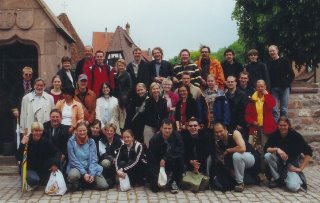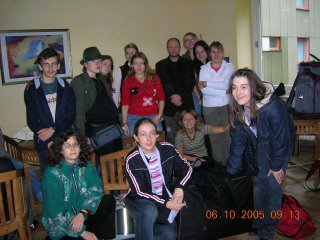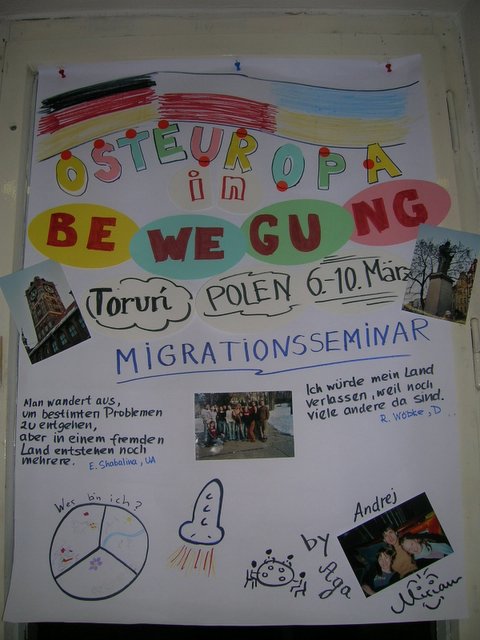The Theodor-Heuss-Kolleg was a funding programme of Robert Bosch Foundation. This collegue supported popularisation of democratic values among young people from East Central Europe.
I was a member of the Theodor-Heuss-Kolleg from May 2005 till July 2006. The photos present the finish of the collegue in July 2006 in Berlin.
Do you have enough of your branch? Look at neighbour branches and combine yours with others. Consider where you live and look for local connections. I work on history, politics, culture and even remembrance in East Central Europe. So pictures and texts here shed light on events, researches and places related to these fields in the regional context.
sobota, lipca 29, 2006
Popularisation of democratic values by the Theodor-Heuss-Kolleg
Etykiety:
civic,
civil society,
collegue,
democracy,
East,
East Central Europe,
Europe,
seminar,
student,
study,
Theodor Heuss,
university
Lokalizacja:
Berlin, Niemcy
Training how to conduct a seminar
I recommend veryone to take part on trainings of every kind. Because I learnt to conduct an international seminar I took part on a training "How to conduct a seminar", which was organised by Theodor-Heuss-Kolleg of the Robert Bosch Foundation.
Etykiety:
civic,
civil society,
collegue,
culture,
democracy,
excursion,
seminar,
Theodor Heuss,
training
Lokalizacja:
Ryga, Łotwa
Eastern Europe on move
Project work is something very important for the personal development of young people. Students of Eastern and Central Europe could learn the project work in practice thanks to the Theodor-Heuss-Kolleg of the Robert Bosch Foundation.
Me as a member of the Kolleg together with two other members conducted an German-Ukrainian-Polish seminar about Eastern Europe on the move in Toruń in March 2006.
Me as a member of the Kolleg together with two other members conducted an German-Ukrainian-Polish seminar about Eastern Europe on the move in Toruń in March 2006.
History of Śląsk / Silesia
History of the borderland on example of Śląsk / Silesia is very important for Poles, Czechs and Germans.
Prof. Angelow (University Potsdam) conducted a seminar related to the history of Śląsk / Silesia from the 18th till 20th century.
Prof. Angelow (University Potsdam) conducted a seminar related to the history of Śląsk / Silesia from the 18th till 20th century.
Seminar group in Krasków by Świdnica
Etykiety:
18th century,
19th century,
20th century,
history,
Polish-German relationship,
seminar,
Silesia,
student,
trip,
university
Lokalizacja:
śląskie, Polska
czwartek, lipca 27, 2006
Difficult neighbourhood in Alsace and Lothringen
Relationships between France and Germany are called often as "difficult". Especially Alsace and Lothringen are the regions which caused conflicts.
So Prof. Jürgen Angelow and Prof. Bernhard Kroener (University in Potsdam) organised a seminar on the "difficult neighbourhood in Alsace and Lothringen in the 19th and 20th century". It took place at different places in Alsace and Lothringen in 2005.
I gave there a lecture about cardinal Richelieu's politics regarding other European countries.


So Prof. Jürgen Angelow and Prof. Bernhard Kroener (University in Potsdam) organised a seminar on the "difficult neighbourhood in Alsace and Lothringen in the 19th and 20th century". It took place at different places in Alsace and Lothringen in 2005.
I gave there a lecture about cardinal Richelieu's politics regarding other European countries.


Etykiety:
Alsace,
Europe,
France,
French,
German,
Germany,
Lothringen,
neighbourhood,
reflection,
relationship,
seminar,
student,
university
Lokalizacja:
Alzacja, Francja
środa, lipca 26, 2006
Bologna process in Germany, Hungary and Poland
Students from almost all European countries should be interested in analyses of studies in Europe after the Bologna process.
The Polish Ministry of Science and Higher Education publishes a number of changes which are important for universities after the Bologna process.
 How it looks like in Germany, Hungary and Poland? Thanks to the cooperation between the Nicolaus Copernicus University, University in Göttingen and Szeged University in Hungary students of those universities could exhange their experiencies after the introduction of Bologna process at universities within a seminar.
How it looks like in Germany, Hungary and Poland? Thanks to the cooperation between the Nicolaus Copernicus University, University in Göttingen and Szeged University in Hungary students of those universities could exhange their experiencies after the introduction of Bologna process at universities within a seminar.
The Polish Ministry of Science and Higher Education publishes a number of changes which are important for universities after the Bologna process.
 How it looks like in Germany, Hungary and Poland? Thanks to the cooperation between the Nicolaus Copernicus University, University in Göttingen and Szeged University in Hungary students of those universities could exhange their experiencies after the introduction of Bologna process at universities within a seminar.
How it looks like in Germany, Hungary and Poland? Thanks to the cooperation between the Nicolaus Copernicus University, University in Göttingen and Szeged University in Hungary students of those universities could exhange their experiencies after the introduction of Bologna process at universities within a seminar.
Etykiety:
East Central Europe,
Europe,
seminar,
student,
study,
university
Lokalizacja:
Getynga, Niemcy
Subskrybuj:
Posty (Atom)



